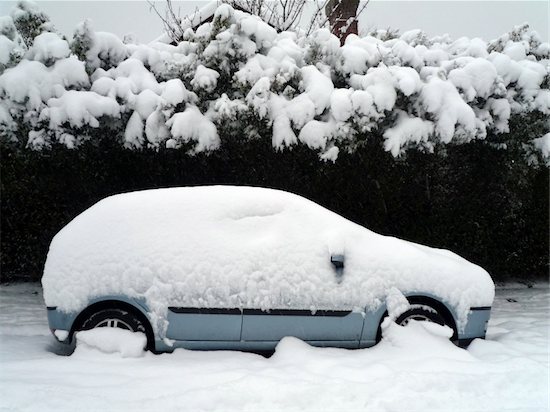Winter Isn’t Over Yet — Know Your Responsibility for Clearing Ice and Snow

The groundhog may not have seen his shadow in February (1), but there is still some life left in this winter. When winter storms dump snow and ice on us, New Jersey residents have some responsibility for keeping our roads and streets safe.
New Jersey has stringent laws regarding removal of snow and ice from vehicles. The law, which took effect in 2010, requires motorists to remove snow and ice from the roofs and hoods of their vehicles before getting on the road. (2) This is to prevent the snow and ice from flying off their cars and trucks into the path of other motorists. Flying snow and ice can cause damage to property, injury to others, and even result in traffic accidents.
Failure to clear your vehicle before driving can result in fines of between $25 and $75. If the snow and ice blows off your vehicle causing damage or injury to others, these fines can increase to between $200 and $1,000. (2) Snow and ice that is allowed to fall freely from uncleared vehicles can also hinder efforts to clean the roads which, in turn, can lead to hazardous driving conditions.
The State’s laws regarding property are not so clear-cut however. New Jersey does require owners of public properties to clear such properties of weather-related debris in all seasons in order to ensure safe accessibility to the properties (3), but these laws do not pertain to owners of private property including homeowners. In fact the State does not require private property owners to clear their property of snow and ice, but individual municipalities do have their own regulations so be sure to check with your local government on your municipal regulations. The sticky part is that New Jersey does have laws which state that if a person attempts to clear their private property and, in doing so, creates more of a hazard, that person can be held liable for injuries to another resulting from that hazard. (4)
Storms in any season can result in hazardous conditions. Taking steps to limit those hazards, if done properly, can help to protect you from liability. If you or someone you know needs assistance with a weather-related injury claim, contact the attorneys at Ragland Law Firm of Lebanon; these attorneys specialize in personal injury cases.
(1) http://www.weather.com/family-kids/pets/groundhog-day-news-20130202
(2) http://www.nj.gov/oag/hts/ice-and-snow.html
(3) http://www.ehow.com/info_8685157_shoveling-snow-laws-new-jersey.html
(4) http://blog.gopenske.com/lease/stay-current-on-snow-and-ice-removal-laws/
 New Jersey Injury Lawyers Blog
New Jersey Injury Lawyers Blog

